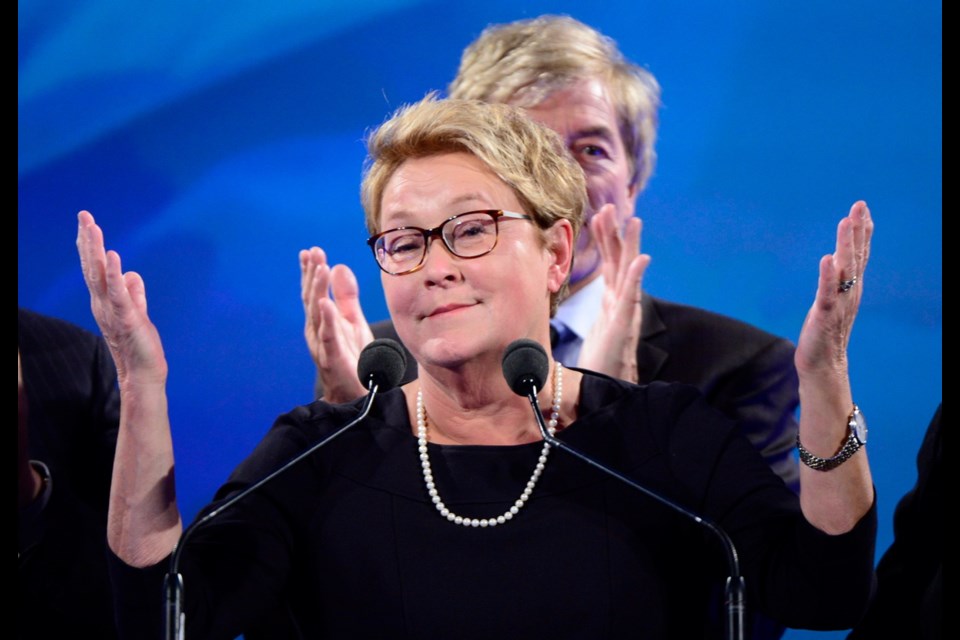LIBERAL 70 PARTI QUEBECOIS 30 CAQ 22 QUEBEC SOLIDAIRE 3
MONTREAL — Relax, Canada — there won’t be a sovereignty referendum in Quebec for at least four years.
Eighteen months after Quebecers threw out Jean Charest — once dubbed Captain Canada for his rousing speeches in the 1995 referendum campaign — they’ve massively elected Philippe Couillard, one of the most federalist Quebec leaders in years.
He helped send the Parti Quebecois to one of its worst electoral defeats by successfully exploiting Quebecers’ distaste for a third referendum in a nasty campaign that voters complained didn’t focus enough on bread-and-butter issues.
The Liberals won 70 of the legislature’s 125 seats on Monday, compared with 30 for the PQ. The Coalition for Quebec’s Future party took 22 seats and Quebec solidaire finished with an additional seat for a total of three.
Couillard, a popular health minister in Jean Charest’s government until 2008, presented himself as a uniter when he addressed ecstatic Liberal supporters late Monday evening.
“We are all Quebecers,” he said in his victory speech in his Roberval riding, which he captured from the PQ. “We should all focus on what brings us together.
“Let us say together, with passion, we’re all proud of being Quebecers. My friends, division is over. Reconciliation begins.”
The PQ will soon be looking for a leader after Pauline Marois announced Monday night she would quit after losing both the premier’s job and her own riding.
“Quebecers have spoken and we must respect their decision,” a philosophical-sounding Marois said to disappointed supporters at a Montreal hotel.
She urged her troops to fight on and said she was proud of the accomplishments of her 18-month-old government.
Marois called the election on March 5, hoping to win a majority based on a campaign of identity politics anchored in its controversial secularism charter, which would have banned public-sector workers from wearing such religious garb as kippas and hijabs.
But the entry of celebrity media mogul Pierre Karl Peladeau as a PQ star candidate derailed the majority scenario when he delivered an enthusiastic, fist-pumping endorsement of an independent Quebec.
The PQ never recovered even though Marois insisted over and over there would be no referendum until Quebecers wanted one.
In terms of popular support, the Liberals pulled in 41 per cent on Monday, a dramatic climb from 31 per cent in 2012. And the PQ finished the night with about 25 per cent, just two percentage points more than the Coalition.
Marois’s defeat follows the crushing of the Bloc Quebecois in the 2011 federal election when it was reduced to four seats and is stunningly similar to one that brought her to the PQ’s top job after Andre Boisclair suffered one of the worst electoral thrashings in the PQ’s history in 2007.
Marois won fewer than the 36 ridings he claimed.
Coalition Leader Francois Legault, who had seen support for his party rebound in recent days, watched dejectedly as results came in Monday night, one hand gripping the side of a white couch as his wife sympathetically patted his knee. He later accepted the voters’ decision with grace.
While no pundit would be foolish enough to declare sovereignty dead, the option has likely been put to sleep for a while. Some observers have suggested it could be years, if not decades, before it is revived.
Much of the attention will now turn to Peladeau as a possible replacement for Marois.
The Quebecor tycoon won his Saint-Jerome riding on Monday night and will likely be front and centre when the jockeying begins in earnest for the PQ’s top job.
Monday’s results in Quebec no doubt prompted a sigh of relief in Ottawa as well.
With the PQ out, it means Prime Minister Stephen Harper won’t have to worry about a national unity crisis as he heads toward the 2015 election.
“The results clearly demonstrate that Quebecers have rejected the idea of a referendum and want a government that will be focused on the economy and job creation,” Harper said Monday.
“We look forward to working with the new government of Quebec on those priorities.”
At dissolution, the PQ had 54 seats, while the Liberals had 49. The Coalition had 18, Quebec solidaire two and there were two Independents.
Voter turnout on Monday was 71.5 per cent, compared with 74.6 per cent in 2012.


